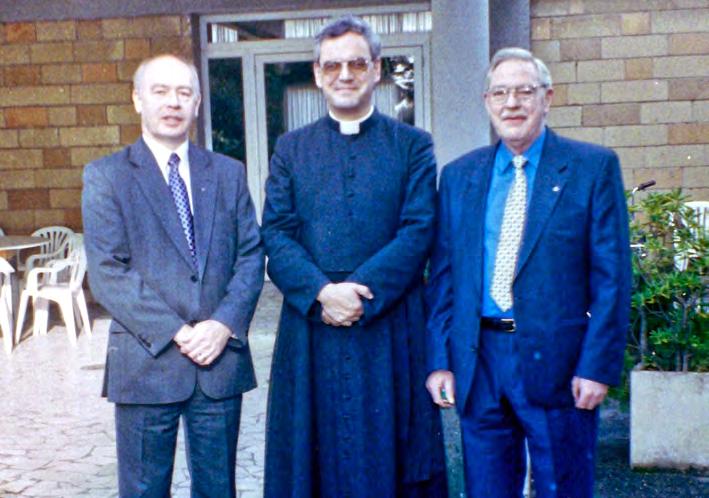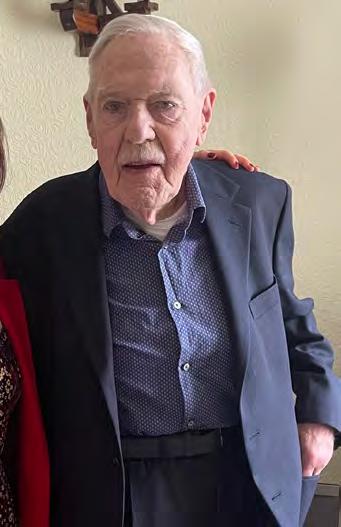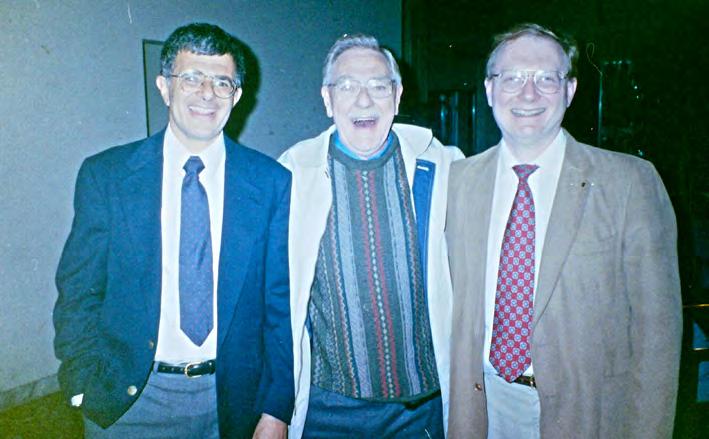
8 minute read
Pride and joy: David Lloyd, 1934-2022
David Lloyd became Secretary of the Latin Mass Society in 1996, and in March 2000 became Chairman, succeeding the long-serving Christopher Inman. He retired as Chairman, at his own request, in September 2003. He continued to be active on the Committee for some years after that, and indeed was an Honorary Officer of the Committee at the time of his death.
As Secretary he edited the Society’s quarterly Newsletter, travelling into the Society’s Office in Macklin Street to do so. It was in his time as Chairman that the Society first took on a paid employee to edit the Newsletter, which was renamed Mass of Ages for the occasion in May 2003. The editor, John Medlin, later combined the editor role with being the Society’s first General Manager, from 2005.
It was as Secretary that David helped to organise, and then to deliver, a massive and beautifully presented international petition seeking greater freedom for the Traditional Mass, in 1997. As recounted in Leo Darroch’s book, Una Voce, this was delivered by hand to the Prefect of the Papal Household. Despite this, the then President of the Una Voce Federation, Michael Davies, was never able to get official confirmation that it had been passed on to Pope John Paul II.
David married Elizabeth (Betty) on 11 February 1961; she died on 3 January 2020. He is survived by three children—Sian, Nicola, and Peter—five grandchildren, and one great-grandchild.

David Lloyd, 17/11/1934 to 3/12/2023: requiescat in pace.
Here is a lightly edited version of the eulogy, composed by David’s son Peter, delivered at his funeral.
It’s difficult to distil 88 years of life into the few moments here. We’ve been told he was an inspiration, a mentor, a lovely man.
We thank the Bishop for granting Dad’s wish for his Funeral Mass to be in the Tridentine Rite. Sustaining the Latin Mass was a passion in Dad’s life. Particularly after he retired in 1992, he devoted a truly staggering amount of time, energy and paper to its cause, travelling extensively in the UK and to Rome.
Of course, these weren’t solely liturgical experiences. He took little persuasion to recover from his strenuous efforts of meetings, singing practice or Mass, with a different form of worship. Few pubs near the Society’s head office or in north Wales, the Wirral. Cheshire and Shropshire escaped his call, especially with Campaign For Real Ale and fellow LMS member Gordon Catherwood in tow
Born in Rhyl in 1934, Dad grew up Holywell, the first son of Sydney and Monica Lloyd. The Lloyds were of Albert House, a drapers.
David was the eldest of three and by his account at least the better behaved of the two brothers, Bob being more mischievous. He was a staunch source of support and counsel to his younger sister, Jennifer.
When his father passed away, Dad left Belmont Abbey School in Hereford where he was a boarder and returned to 21 Halkyn Street, Holywell, which Mum and Dad bought from our grandmother in the early 1960s. It remained his home for the next 60 years. In the last 12 months people have asked Dad, ‘How long have you lived here?’ to receive his typically curt ‘all my life’ in response, as if the question was impertinent.
He has described a fairly uneventful National Service in the RAF. Yet he took part in Queen Elizabeth’s Coronation, spent time disposing of mustard gas in the Irish Sea, and not heading to Suez. He worked as a rep. for Keillers, living in Cheltenham before and briefly after marrying Mum, then joined the National Provincial Bank in Chester and then the Nat West in Flint and Holywell.
No 21 Halkyn Street will be remembered as a place where Dad indulged his other passions. If he had a motto, it must surely be, ‘If a job’s worth doing, it’s worth doing well’. He cooked, he gardened, he learned (badly, to be fair) French, and, always partial to a drink, he brewed things.
But he didn’t just brew it did he? He collected things from the gardens of Basingwerk House, filled the kitchen (and airing cupboard) with buckets and bottles and demijohns and the house with aromas of yeast, malt, hops, barley and sterilizing powders. He experimented with ways to bottle it, storing it in cupboards, racks, under the stairs and in crates in the shed.
He didn’t just make it, he studied it in guides, magazines, books and atlases. He drove through the gates of Bordeaux Chateaux or Alsace mansions where the public were, shall we say, generally discouraged. No problem, he invariably came out with a case.
He delighted in how cheap it was in France or Spain, and was convinced the shopkeepers of Italy were selling knockoff whisky at those prices. That simply encouraged him.
If he arranged manure for the garden it was truckloads, in mountain sized piles on the road, stopping traffic, typically (for him) on a Good Friday, when half of Holywell was heading to the funfair in one direction, the rest trying to escape the A55 traffic heading into north Wales in the other. Absolute chaos.
He didn’t just put the manure on the garden: he had first completely removed all the top and subsoil, down to about three feet, a convoy of barrows shifting the tonnes of waste to the council tip just up the road. He brought in new topsoil and hand riddled it to remove stones and waste.
That created his garden, which was his absolute pride and joy. As children it fed us apples, potatoes, carrots, peas, tomatoes, runner beans and blackcurrants. In retirement it evolved into a truly spectacular flower garden with striped lawn. We weren’t allowed to walk on it – though he began to relent for the grandchildren. In the front garden there were magnificent displays of spring daffs and tulips, summer baskets of fuchsias, geranium and begonia. He nurtured, watered, deadheaded, composted, filled windowsills with cuttings and seedlings and kept hairy bulbs in the airing cupboard over winter. He timed periods when he was away (only ever short), ensuring neighbours or family watered it when he was on holiday. In later years he solved that problem with an irrigation system.
He cooked, very well it has to be said: few people make their own consommé for lunch, or ice cream dessert. He bought strawberries from fruit farms, made custard and perfected it. It really was wonderful ice cream.
I’ll pose this one as a question rather than a statement. Was he sartorial? He will be remembered for the occasionally jaunty hat on a narrowboat, for blazers, socks, shirts, bright yellow trousers, and who could forget those crimson Gieves & Hawkes slacks in Spain in 1987? Perhaps he was colour blind.
When Mum died, he bought himself a bright red carpet and bedding for his room. Just because he’d always wanted one, and Mum hadn’t let him.
And so to the last few years. Dad missed Mum terribly and few could have imagined that, just a few short weeks after her passing, he, like so many, would find himself in No. 21 waiting for the pandemic to end, on his own. Afterwards, he travelled between the family, and with increasing support, remained independent until late summer. Sharp as a pin when he wanted to be, he grasped the word “holiday” during a meal with him the weekend before he passed away.
He said: ‘Don’t forget to leave some room in the car for me.’
Kevin Jones, the LMS’s long-standing Representative for Wrexham, who succeeded David in that role, writes:
‘I wished I’d known David for a long time before I got really acquainted with him. Indeed, when I first met him, I was quite terrified of his nononsense approach to discipline in the schola he directed! It was of course a case of his bark being a lot worse than his bite, as I later learned. He was a gentleman and just said it how it was, always with manners and always with one objective: the glorification of God to the best of our capabilities.
‘He was meticulous in his preparation for the Holywell Pilgrimage, having me and Andrew Nielson at the church to prepare it from 10.30am, for a Mass not beginning until 2pm. We would spend ages aligning the Altar Crucifix with the centre of the Altar and the wall-mounted crucifix above the Tabernacle. David would stand in the aisle – “left a bit”, “right a bit,” “No, you are not listening”, he would say. Of course, we would never be able to get it centred because the forward Altar wasn’t centred to the Tabernacle, as he later revealed!'
A Sung Requiem Mass will be celebrated for David Lloyd at 6.30pm, Monday 13th February in Corpus Christi, Maiden Lane, in London. The Society hopes to organise another in SS Peter & Paul & St Philomena in the Wirral: to be confirmed.

David and Dr John Rao (right) and Michael Davies (left).










